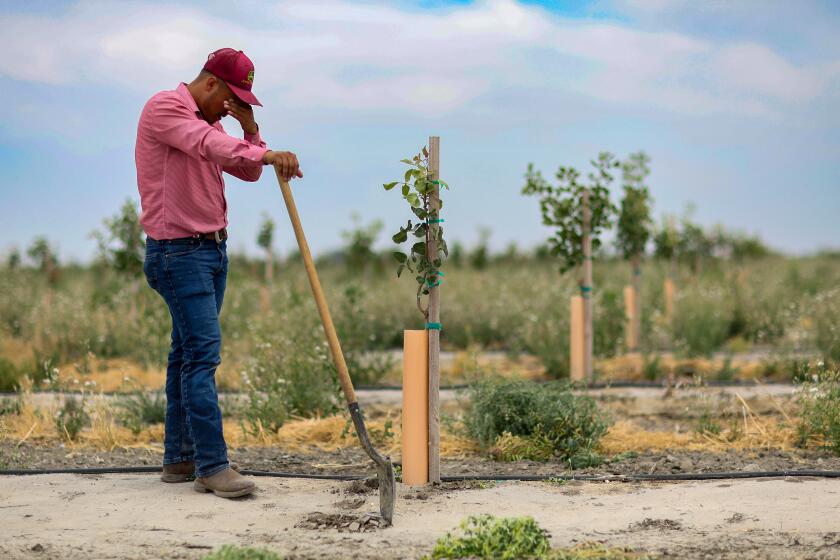Parents See Family Ties as Lasting : Poll: Most adults say they are very close to their children and expect that feeling to continue even as they foster independence.
For Bonita Lejejs, family is everything.
As do three-quarters of parents queried in The Times Orange County Poll, Lejejs says she has a very close relationship with her children. And, just as she has felt close to her own parents in adulthood, she expects to be close to her children when they are adults.
“My fantasy is that when my children (Sofie, 12 and Nick, 14) are grown up, we will still be close,” said the 47-year-old Dana Point woman.
While economics, divorce, remarriage and other factors have changed the shape of many families, three-quarters of the Orange County parents surveyed say their families are very close. Just 3% say they are not close at all to their children.
The feeling of closeness is dominant in all groups--but especially so in families with young parents. In older families, more say they feel only somewhat close.
All but 18% of parents with children living at home say they feel very close to their children.
In follow-up interviews with parents who participated in the poll, some talked about the double-edged process of developing a bond of intense closeness with children and then letting them pull away.
When their children are ready to move out of the house, Lejejs said, she and her husband hope that while remaining close, “they will be independent and won’t require us to complete their lives.”
Mark Jasper, an unemployed aerospace worker in Anaheim, says he feels very close to his son but expects to be only somewhat close to him once he becomes an adult. He says it will be hard to see Nathan, 9, move away someday, but he’s prepared for that.
“I love him a lot. I want to be there for Nathan no matter what age he is. But I also don’t want to be the kind of parent that manipulates (a) child’s future. When you bring up a child, you learn that you just have to let go of them little by little,” Jasper said.
Jasper, 40, said his lack of a job places a strain on the family, but that it hasn’t hurt his close relationship with Nathan. “My wife, Gayle, and I are involved at his school. We feel that’s very important. I play baseball with Nathan. We go swimming, to the mountains and to the beach.”
In describing his relationship with his parents, Jasper says that while he loves them and would take care of them should they need his support, he is only somewhat close to them. He sees his mother and father, who live in Las Vegas, about once a year. Otherwise they have only occasional contact--such as on holidays. “I’m not much of a phone-caller or a letter-writer,” he said.
*
While 82% of Orange County parents with children at home said they were very close to their children, only 55% said they were that close to their parents. Still, two-thirds expected that they would be very close to their own children once they were old enough to move out of the house.
Kelley Boero, 32, a Newport Beach mother of two, said that although her parents live in Sacramento, she keeps in close contact, telephoning them three to five times a week.
“I’m very close to my mom and dad, and I think our children--Isabel, 6, and Armand, 4, will be that close to us when they are grown,” Boero said.
Boero, who grew up in a rural area, said there were not so many distractions from family life there. In urban Orange County, she said, there’s no space for children “to run free,” and there’s “too much shopping.”
Boero said that she and her scientist husband Francis are very family-oriented. “He does science experiments with the children. We bake bread together. We go camping. And we don’t have a television,” Boero said.
Kimberly Claytor, 33, of Costa Mesa, said facing adversity has brought her closer to her children.
She is the mother of four--three from a marriage that ended in 1984 and a fourth from a current relationship. When she divorced, she was 24, and her children were ages 3, 2 and 10 months. After her divorce, Claytor went back to college and now works as a lab technician at UCI.
“When I look at 24-year-olds today, I think back that I had three kids when I was that age, and I realize I was really growing up myself then and was immature. I realize that all of us seemed to grow up together.”
The ups and downs they have weathered--including the death of her mother--have drawn her and her children very close, Claytor said. “Life isn’t easy, and we don’t pretend that it is. We are very open with our feelings.”
She has been in no rush to marry again, although she is in a committed relationship with the father of her youngest child, age 2. “If the commitment is there, it’s there. If it’s not, it’s not, and a piece of paper won’t make a difference,” she said.
Claytor, whose parents divorced, said she has a very close relationship with her father, who lives in Santa Barbara, and was also very close to her mother, who died in 1985. She says she expects her close relationship with her children will continue when they are grown. “I think they will be there for me,” she said.
*
Having open communication between parents and children was cited by George Raymond, 65, of Fountain Valley, as one of the most important ways to achieve family closeness. “Some kids today are afraid to talk to their parents,” he said.
“We have one daughter, 29, and all her life she has been able to discuss anything with us--especially with her mother--boys, sex and everything else.”
The family remains close. In fact, financial circumstances have made it necessary for the Raymonds’ daughter, who works as a waitress at a country club, to continue to live with her parents.
Overall, more mothers polled expressed deep feelings of closeness to their children than did fathers. Eighty-two percent of mothers said they were very close to their offspring, compared with 72% of fathers.
Dinner is used by many as a time to catch up on what’s been going on during the day and to discuss issues important to the family. Two in three parents said they have a regular dinner hour with their children; one-third said they infrequently or never eat meals together.
Families in which both parents work report having the most trouble finding time to eat together--64% of dual-career couples say they have a regular dinner hour, compared with 77% of families where one parent does not have a job outside the home.
A number of those polled said their feelings of closeness were tied to the amount of time spent together--although closeness was reported by both working-outside-the-home and at-home parents.
Rita Hawkins of Mission Viejo said she takes child-rearing very seriously, adding that that is what leads parents to establish a special closeness with their children.
“I had grown up in a very poor family, and my mother always worked,” said Hawkins, 54, who took time off from her career to raise her son, David. “She had eight children and didn’t have a lot of time to spend with us. So when we had David, my husband and I agreed that if you are going to have a child, you should be there for him.”
It was difficult giving up her career as a supervisor at TRW to stay home and raise a son, she said. But devoting so much time to her son, now 14, has been worth it. “We are pals. We go to movies together. We talk, and we go out to dinner,” she said. This summer, they plan to travel to China.
Hawkins calls David her “miracle baby” because he was born even though doctors had told her she could never bear children. As a result, she says she is a protective mother, not allowing him do things such as ride the school bus or ride his bike to a nearby mall.
Hawkins also expects to have a very close relationship with her son in the future.
*
Providing a vivid example in the connection between generations were those who in addition to raising their children also took care of their mothers or fathers--the so-called sandwich generation. Of those with children still at home, 13% said they also had a lot of responsibility for the care and support of an older parent.
Hawkins is among those who have cared physically for an older parent. For a year before her father died of cancer, he lived with the family.
“I couldn’t put him in a nursing home. I wanted to be the one to take care of him,” she said.
Overall, one in 10 Orange County adults says he or she has a lot of responsibility for the care or support of an older parent.
Not becoming a burden for their children when they are old was a concern expressed by Jasper and others. But accepting that responsibility was seen as part of being a family member.
Jasper said that while he hopes that he and his wife will never be in a position where their son has to support them financially, they would expect him to be there for them emotionally.
It is his view that being a part of a family means being there when you’re needed--whether it is in childhood or adulthood.
Several poll respondents said the loss of a parent helped bring family closeness into sharper focus.
Lejejs said that coping with the death of her father three years ago made her realize more than ever the importance of family love.
“As we are all getting older,” she said, “we realize all we really have in life is each other--our family.”
How the Poll Was Conducted
The Times Orange County Poll was conducted by Mark Baldassare & Associates. The telephone survey reached 750 Orange County adults during a four-day period ending June 6. Using a computer-generated random sample of listed and unlisted telephone numbers, the poll contacted residents on weekday nights and weekend days. The error margin for all respondents is plus or minus 3.5 percentage points. For the subgroup of parents with children at home, the margin of error is plus or minus 5.5%.
Family Closeness
Patterns of family closeness evolve over time, with parents of young children most often saying they feel very close to their children. Nearly half of parents characterize their relationship with their own parents as very close, but two in three expect to be that close to their own children when they reach adulthood.
Relationship With Children
Three of every four Orange County parents, whether their children are young or grown, characterize their relationship with their offspring as being “very close.” The proportion is slightly higher among those with a child living at home.
* How close a relationship do you currently have with your children?
All Child parents at home Very close 76% 82% Somewhat 21% 17% Not close 3% 1%
Relationships With Parents
Nearly half of all Orange County adults report they are “very close” to their parents. Age is a distinct factor, with younger adults more likely to say they have this relationship.
* How close a relationship do you currently have with your parents?
55 and Total 18-34 35-54 older Very close 45% 58% 48% 20% Somewhat 31% 36% 37% 9% Not close 3% 3% 2% 5% Not living, incapacitated 21% 3% 13% 66%
Expectations for Future
While a slight majority of parents now raising children say they are “very close” to their own folks, eight in 10 say they have this kind of relationship with their children at home. Two-thirds expect the strength of that connection to continue when their children are grown and living independently.
* Parents with children at home:
Relations Relations Relations with own with children with children parents now at home in future Very close 55% 82% 67% Somewhat 37% 17% 30% Not close 1% 1% * Not living, incapacitated 7% --- --- Don’t know * * 3%
* Less than 1%
Caring for Parents
Just 10% of Orange County adults report having a lot of responsibility for the care and support of an older parent. About three in 10 say they have at least a little of such an obligation.
* At present, how much responsibility do you have for the care and support of an older parent?
Adults A lot 10% Some 10% A little 9% None at all 71%
Regular Dinner Hour
Two parents in three say they frequently have a regular dinner hour with their children. These frequent repasts are less likely to take place in more affluent households and those where both parents have careers.
* How often does your family have a regular dinner hour when everyone eats together?
Earning Earning One Both All less than $50,000 parent parents parents $50,000 and more at home work Frequently (4-5) 67% 71% 64% 77% 64% Infrequently (1-3) 33% 29% 36% 23% 36%
Source: Times Orange County Poll
The Embattled Family
*SUNDAY: Exposure of their children to sex and violence depicted on television and other entertainment media is the worry parents cite most often.
* MONDAY: Most Orange County residents are content but feel much less secure about their finances than three years ago, a concern that’s bleeding into other areas of their personal happiness.
* TUESDAY: Moms and dads fret about different issues, and this may reflect not only traditional male and female reactions to threats but also may explain a gradual evolution in the roles of each parent.
* TODAY: Divorce, remarriage and economics may be reshaping many families, but three-fourths of Orange County parents still believe their clans are close, especially young families.
* THURSDAY: More people still believe medicine will be the best job path for their children but, shaped by perceived dark economic winds, they have scaled back other expectations for the future of their offspring.
More to Read
Sign up for Essential California
The most important California stories and recommendations in your inbox every morning.
You may occasionally receive promotional content from the Los Angeles Times.






